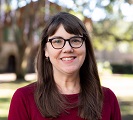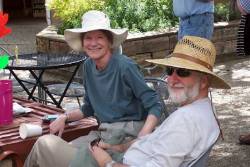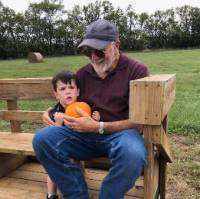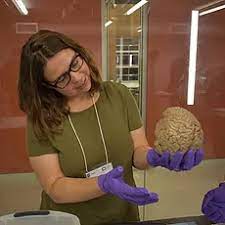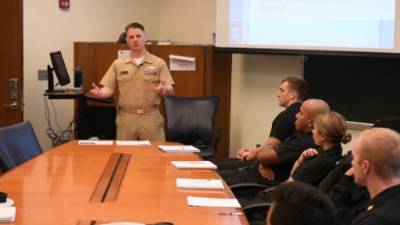Upcoming Events
Friday, August 15th
6:30-9:30pm in RSC 262
WelcomeFest Philosophy Film Night
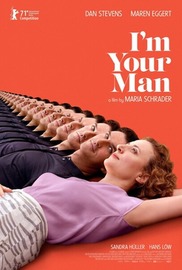 The Department of Philosophy invites all WSU students to an on-campus showing of the
film "I'm Your Man" by Maria Schrader.
The Department of Philosophy invites all WSU students to an on-campus showing of the
film "I'm Your Man" by Maria Schrader.
Synopsis: As part of an experiment she has reluctantly agreed to participate in, scientist Alma must live with a humanoid robot with artificial intelligence designed to allow it to morph into that of her ideal life partner. This comedy raises provocative questions about AI, love, and life.
(Optional) Breakout Discussions Following the Showing
Recent Events
Thursday, May 8
 3:30-5:00pm in the Fiske Hall Library Annex
3:30-5:00pm in the Fiske Hall Library Annex
Pizza and congratulations to our graduates
A good time was had by all, and the results are in!
-
- A hot dog is not a sandwich.
- A whole pizza can perhaps qualify as a slice if the round was sliced from a batch of dough.
Many other deep conversations were had about life, school, and the burning questions of the day. Thanks to all who could make it to our end of year pizza party and graduation celebration for VC and CP. We wish you the best!
For our returning students, don't forget to enroll for Fall! We have an exciting lineup with something for everyone.
Wednesday, January 29
3:30-5:00pm in Fiske Hall
Join us to celebrate Chinese New Year as part of Spring 2025 Welcomefest. We're having a scavenger hunt, snake painting, authentic Chinese dumplings, and more!
Friday, December 6
Cookie Decorating Party
Come celebrate the end of the semester with us in the Philosophy Library Annex, Fiske 009 from 11:00am - 1:00pm.
Thursday, October 10, 2024 3:30 – 5:00 pm
Jason Matteson, Kansas State University
"Choosing Well and Living Well: How Friendships Matter in Engineering Ethics"
Abstract
Aristotle argues there are three basic types of friendship, namely, friendships of
pleasure, usefulness, and character. He claims that a clear-eyed understanding of
the various types of friendship is central to choosing well and living well. I extend
this general framework to ethics in professional engineering. I argue that there is
a fourth type of friendship, what I call a common values friendship. These friendships are organized around the voluntary pursuit
of some shared values, for instance, those found in a professional field. I argue
having such friendships is uniquely helpful for engineers to reliably choose well.
I also argue for the stronger claim that such friendships are at least partially constitutive
of living a good life for those working in modern engineering fields.
Aug. 5-6, 2024
Philosophy Summer Camp, 9:30 a.m. - 3:45 p.m.
The WSU Philosophy Department will host its inaugural, two-day Philosophy Summer Camp. This day camp for high school juniors and seniors features activity-centered sessions led by members of the Philosophy Department, spanning a variety of exciting topics.
Learn more about Philosophy Summer Camp 2024
Feb. 28, 2024
Philosophy Bowling Bash, 5-7 p.m.
WSU Philosophy majors, minors, and friends are encouraged to join for an afternoon bowling party with philosophy faculty at Shocker Lanes in the basement of the Rhatigan Student Center (RSC).
Saturday, April 13
KPS41: 41st Annual Meeting of the Kansas Philosophical Society
9 a.m. - 4 p.m., Rhatigan Student Center (RSC) Room 262 (Herman Room)
Great news! We're hosting the Kansas Philosophical Society Meeting at WSU. Sessions are free and open to the public!
Meeting Schedule:
- 9 - 9:45 a.m. Registration and continental breakfast
- 9:45 - 10 a.m. Opening Remarks
- Session I: 10a.m. - 12p.m. Session Chair: Susan Castro
- "Knockdown Arguments in Philosophy and Epistemic Underdetermination", Howard Liu, University of Miami
- "Arisotle's Categorical Syllogistic and its Relation to Scientific Knowledge", Minxing Huang, University of Kansas.
- Lunch: 12-1p.m.
- Session II: 1 - 2 p.m. Session Chair: Ian Smith
- "Privacy as Obscurity: Inference, Big Data, and Attentional Resources", Clint Hurshman, University of Kansas
- "The Question of Institutional Stability", Cole Bruening, University of Kansas
- Break: 2 - 2:30 p.m.
- Session III: 2:30 - 4:30p.m. Session Chair: Dennis Arjo
- "Xunzi and Freud: How not to do Comparative Studies", Xiufen Lu, Wichita State Unviersity
- KPS Business Meeting: 4:30 - 5p.m.


